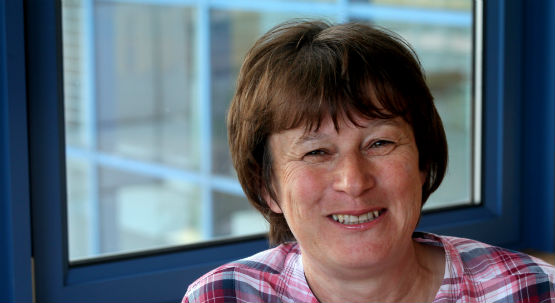White blood cells discovery points to disease breakthroughs
Published On Mon 25 Apr 2016 by Roddy Isles

Researchers at the University of Dundee have made new discoveries about the importance of nutrients for a subpopulation of white blood cells - T cells - that play a vital role in fighting cancer and infections.
Professor Doreen Cantrell, Wellcome Trust Principal Research Fellow in the School of Life Sciences at the University, said the discovery opened up a new area to explore for pharmacological targets in T cell-mediated diseases, as well as in cancer therapy and chronic infection.
The research was conducted by Professor Cantrell along with Professor Daan van Aalten and further colleagues at Dundee. The results are published in a paper in the journal Nature Immunology.
Professor Cantrell is internationally renowned in the field of immunology as one of the world’s leading authorities on the biochemical regulation of T lymphocytes, the white blood cells which control the immune system and which are a factor in many diseases.
T cells need to rapidly grow to effectively fight infections, therefore they need lots of nutrients like sugars for energy. But sugars are also used for other purposes in a cell and one such use is to make a special sugar modification called O-GlcNAc, which is added to proteins inside the cell by an enzyme called O-GlcNAc transferase (OGT). The new research focused on this process.
“We found that T cells regulate the levels of O-GlcNAc-modified proteins in response to the availability of sugars in their environment, and this tells them when to multiply" said Professor Cantrell.
“Without OGT, T cells don't develop properly, and can't respond to an infection. T cells found in tumours and during chronic viral infections are often deprived of nutrients, particularly sugar, and this new mechanism may explain why nutrient-deprived T cells can't function efficiently.”
Importantly the researchers also showed that OGT modifies the important proto-oncogene Myc in T cells, which is necessary for both normal T cells and cancerous T cells to grow and multiply.
They found that O-GlcNAc-modified Myc is protected from being degraded by the cellular machinery, which allows it to carry out its functions driving cell growth.
“Blocking OGT-reduced Myc levels stopped T cells from expanding,” said Professor Cantrell. “Excitingly, a similar effect was seen in a T cell leukaemia system, where uncontrolled T cell growth was prevented by deletion of OGT.
“There are a large number of instances where controlling T cell growth might be important, such as in leukaemia and autoimmune diseases, where the 'wrong' T cells multiply. Conversely, finding ways to boost OGT function might help nutrient-starved T cells fight infection or cancer.
“With these new insights into how T cells sense their environment, we have a vast new area to explore for pharmacological targets in T cell-mediated diseases, as well as in cancer therapy and chronic infection. We look forward to exciting times ahead.”
This research was supported by the Wellcome Trust and Tenovus Scotland.
NOTES TO EDITORS
Life Sciences at the University of Dundee
The University of Dundee is the top ranked University in the UK for biological sciences, according to the 2014 Research Excellence Framework.
Dundee is internationally recognised for the quality of its teaching and research and has a core mission to transform lives across society. More than 17,000 students are enrolled at Dundee, helping make the city Scotland’s most student-friendly.
The University is the central hub for a multi-million pound biotechnology sector in the east of Scotland, which now accounts for 16% of the local economy. www.dundee.ac.uk
The Wellcome Trust is a global charitable foundation dedicated to improving health. We support bright minds in science, the humanities and the social sciences, as well as education, public engagement and the application of research to medicine.
Our investment portfolio gives us the independence to support such transformative work as the sequencing and understanding of the human genome, research that established front-line drugs for malaria, and Wellcome Collection, our free venue for the incurably curious that explores medicine, life and art. www.wellcome.ac.uk
For media enquiries contact:
Roddy Isles
Head of Corporate Communications
University of Dundee
Nethergate, Dundee, DD1 4HN
Tel: +44 (0)1382 384910
Mobile: 07800 581902
Email: r.isles@dundee.ac.uk